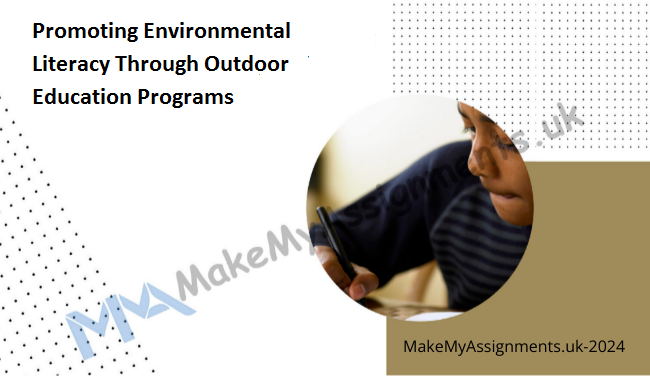Preparing a law assignment is no easy task. Students pursuing law often find themselves juggling…

Promoting Environmental Literacy Through Outdoor Education Programs
In today’s world, where environmental issues are at the forefront of global concern, fostering environmental literacy has become imperative. Environmental literacy entails not just understanding environmental concepts but also developing the skills and motivation to address environmental challenges. One powerful way to achieve this is through outdoor education programs. These programs, which take learning beyond the confines of classrooms and into the natural world, offer a holistic approach to environmental education. Let’s delve deeper into how outdoor education programs can promote environmental literacy.

Connecting with Nature:
Outdoor education programs provide individuals with direct experiences in nature, fostering a deep connection and appreciation for the environment. When learners interact with the natural world firsthand—whether through hiking, camping, or conducting field studies—they develop a sense of stewardship towards the environment. This connection is fundamental in nurturing environmental consciousness and motivating individuals to take action to protect the planet.
Experiential Learning:
Experiential learning lies at the heart of outdoor education programs. Instead of passively absorbing information from textbooks, participants engage in hands-on activities that encourage critical thinking, problem-solving, and observation skills. For instance, they might analyze water quality in a nearby stream, identify local plant species, or study animal behavior in their natural habitats. By actively participating in such activities, learners not only deepen their understanding of environmental concepts but also develop a sense of empowerment to effect change.
Multidisciplinary Approach:
Outdoor education programs often incorporate various disciplines, including science, ecology, geography, and even art and literature. By integrating these different fields of study, participants gain a holistic understanding of environmental issues. For example, while studying a forest ecosystem, learners might explore its biological diversity, its geological features, its role in climate regulation, and its cultural significance to indigenous communities. This multidisciplinary approach fosters a more comprehensive and interconnected view of the environment.
Fostering Environmental Ethics:
In addition to imparting knowledge, outdoor education programs also emphasize the development of environmental ethics and values. Through guided discussions, reflective activities, and ethical dilemmas, participants contemplate their role as responsible stewards of the environment. They learn to recognize the interconnectedness of all living beings and the importance of preserving biodiversity and natural resources for future generations. This cultivation of environmental ethics lays the groundwork for informed decision-making and sustainable behaviors.
Building Community:
Outdoor education programs often foster a sense of community among participants. Whether through team-building exercises, shared outdoor experiences, or collaborative projects, individuals develop bonds with their peers and mentors. This sense of community not only enhances the learning experience but also provides a support network for collective action. By working together towards common environmental goals, participants feel empowered to initiate positive changes in their communities.
Empowering Active Citizenship:
Ultimately, outdoor education programs aim to empower individuals to become informed and engaged citizens who actively participate in environmental conservation efforts. By equipping learners with the knowledge, skills, and motivation to address environmental challenges, these programs lay the foundation for a more sustainable future. Whether through advocacy, community initiatives, or personal lifestyle choices, graduates of outdoor education programs are poised to make meaningful contributions to environmental stewardship.
MakeMyAssignments.uk recognizes the critical importance of environmental literacy and understands the value of outdoor education programs in achieving this goal. As an academic assistance platform dedicated to supporting students in their educational journey, MakeMyAssignments.uk offers a range of services tailored to enhance students’ experiences with outdoor education programs and promote environmental literacy effectively.
Customized Learning Resources:
MakeMyAssignments.uk provides students with customized learning resources designed to complement outdoor education programs. Whether students need study guides, research materials, or supplemental reading materials, the platform offers tailored resources that align with the objectives and curriculum of outdoor education programs. These resources enhance students’ understanding of environmental concepts and facilitate deeper engagement with outdoor learning experiences.
Expert Guidance and Support:
MakeMyAssignments.uk connects students with expert tutors and mentors who possess extensive knowledge and experience in environmental science, ecology, and related fields. These tutors provide personalized guidance and support to students participating in outdoor education programs, helping them navigate complex environmental concepts, conduct research, and develop critical thinking skills. Through one-on-one tutoring sessions, students receive individualized attention and feedback to enhance their learning outcomes.
Academic Writing Assistance:
Outdoor education programs often involve assignments, projects, and research papers that require students to demonstrate their understanding of environmental issues and concepts. MakeMyAssignments.uk offers academic writing assistance to students, helping them effectively communicate their ideas, research findings, and reflections in written form. From essay writing to project proposals, the platform’s expert writers assist students in producing high-quality academic work that meets the standards of their outdoor education programs.
Fieldwork Support:
Fieldwork is a fundamental aspect of outdoor education programs, allowing students to observe, collect data, and conduct experiments in natural environments. MakeMyAssignments.uk provides fieldwork support to students, offering guidance on research methodologies, data collection techniques, and fieldwork logistics. Whether students need assistance in designing field studies, analyzing data, or interpreting results, the platform’s experts offer valuable support to ensure the success of their outdoor learning experiences.
Collaborative Projects:
MakeMyAssignments.uk facilitates collaborative projects among students participating in outdoor education programs, fostering teamwork, creativity, and innovation. Through online collaboration tools and platforms, students can collaborate on environmental research projects, community initiatives, and advocacy campaigns aimed at addressing local environmental challenges. By working together towards common goals, students develop leadership skills and contribute to positive environmental change in their communities.
Environmental Literacy Workshops:
MakeMyAssignments.uk organizes environmental literacy workshops and seminars to supplement students’ outdoor education experiences. These workshops cover a range of topics, including sustainability, biodiversity conservation, environmental policy, and ecological stewardship. Led by experts in the field, these interactive sessions provide students with valuable insights, perspectives, and practical skills to enhance their environmental literacy and empower them to become effective environmental advocates and leaders.
In essence, MakeMyAssignments.uk serves as a comprehensive academic support platform for students participating in outdoor education programs, offering customized learning resources, expert guidance, academic writing assistance, fieldwork support, collaborative projects, and environmental literacy workshops. By partnering with MakeMyAssignments.uk, students can maximize the educational benefits of outdoor learning experiences and develop the knowledge, skills, and motivation to address environmental challenges effectively.




This Post Has 0 Comments